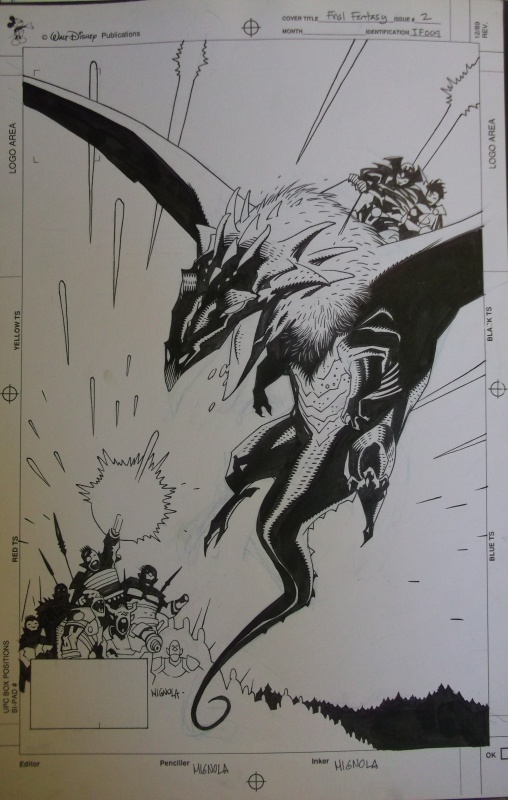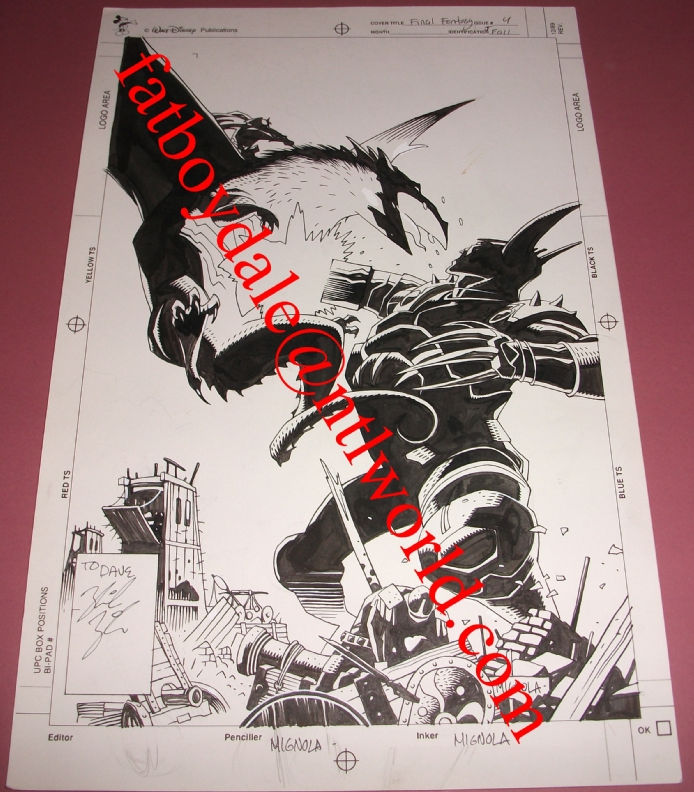So my current replay of FF6 has sparked some discussion over on the forums, as you might expect.
My previous post, asserting that the Auction House is the worst thing in the game, met with some debate from TA and Brent, who contend that the Veldt is the worst thing in the game. From there, discussion ensued about Gau's utility, and I mentioned that I'm going out of my way to use characters on this playthrough who I don't normally use and how putting Strago, Relm, and Locke in my party made the Floating Continent a much more defensive affair.
Brent interjected that strategy is not a subject he associates with FF6 ("I always thought the RPG bits were just the glue holding together a pretty good steampunk fantasy novel"); Ocksi and I got to talking about the unlikely prospect of a remake in the style of 3 and 4 for DS -- and I bridged the two points, noting that while the best we're likely to get is a prettied-up-but-primitive port like on the PSP (and even that's not looking likely right now), FF6 is a game that could really use the sort of serious rebalancing that the DS remakes got. Brent suggested the following:
If I were redoing the game I'd just do away with the Fight command completely and let everyone have their own wholly unique attack mechanic. That'd mean a lot of new minigames and some changes to existing specials (Cyan shouldn't hold up the entire damn fight, Setzer shouldn't randomly end the game), but I don't think many people would complain.
and we went from there.
Most of this was originally posted on Brontoforumus, 2013-08-11, but I'm making some notes and revisions here as I go.
That'd be pretty tempting, yeah. Make Terra and Strago pure magic, say? And give them an FF12-style Charge move in case they run out of MP.
Further thoughts:
Give monsters AI. Make them only heal as needed, and not re-cast offensive/debuff/negative status spells on characters they have no effect on. Obviously you'd need to rebalance their attacks, because there would be absolutely no reason for a Stray Cat ever to use its standard attack instead of Cat Scratch. (Which I guess is the same problem with Edgar, Sabin, Cyan, and the Fight command.) Maybe add charge time to the more powerful attacks? I'll get back to charge time in a minute.
Either give Gau, Mog, and Umaro AI much like what I described above, or make them controllable. (Or, ooh, here's a thought: have them initially fight based on AI, but introduce a relic in the second half of the game that allows you to control them, like the FakeMustache turns randomized Sketch into Control.) Make your character controllable in the Coliseum, too.
(Mothra interjected that he liked not controlling his character in the Coliseum. I don't, at all, but if they were to keep it that way they'd definitely need to give it the same kind of AI upgrade that I suggested above -- Sabin should never, ever use Spiraler; if you know Firaga you shouldn't be casting Fire; and if you cast Scan I'd better see you using your next turn to exploit any elemental weaknesses it pulled up.)
Gau/Veldt: Make Gau automatically learn rages from every monster he defeats, whether he's on the Veldt or not.
Veldt can still serve a purpose as the place where you can re-fight monsters from earlier in the game -- but needs a few tweaks.
First of all, get rid of the current arrangement of monsters (where you fight a random group from an ordered list). Split the Veldt up by region -- maybe arrange it so that it resembles the world map in miniature. Go to an area on the miniature map and you'll fight monsters from that part of the world map. (Obviously this would be a little trickier to implement in the WoR -- do you have a mix of WoB and WoR monsters in each region, or find some way to split it up into two miniature world maps?)
And no more missable Veldt monsters. If you've been to a region, monsters from that region will show up on the Veldt, whether you've encountered them or not. (The exceptions would be the two bosses, provided you even keep them as Veldt monsters; that was always kinda weird.)
Oh, and no missable dances, either. Create some persistent location where you can learn the Water Dance in the WoR. Maybe make the Serpent Trench, Ebot's Rock, anywhere else that was underwater in the WoB into a marshland that counts as water.
Celes: While Terra and Strago make sense as pure mages from a plot perspective, Celes doesn't. She's been raised as a warrior from infancy; you'd have to expect she'd at least know how to handle a sword when MP runs out. I say make her an FF5-style Mage Knight; give her the ability to enchant weapons with elements or effects. You could keep Runic, but if so you'd want to make it useful late in the game by, for example, making it only draw enemy magic (maybe have this be another ability that gets upgraded by a Relic), or you could drop it entirely in favor of Magic Sword.
Magic: The four natural mages (Terra, Celes, Strago, Relm) should have visibly better magical aptitude than everybody else. I think everybody else's magic stats (Magic, MP, M Evade, M Def) should be nerfed -- not to the point where magic is useless, but to the point where it's noticeably less effective than when the natural mages do it. (Gogo's actually a pretty good example of a character who can still use any ability in the game but is visibly worse at it than its natural practitioner.) I'm thinking you could also add charge times for the non-natural magic users to cast their spells.
And speaking of charge times, that's what you do with Cyan. Have him pick his attack from a menu and then initiate the counter; if you want to do, say, #7, it'll still take just as long to prepare, but everybody else in the party can keep doing their thing while he's preparing it.
Also, either eliminate his intermediate attacks or make them useful.
Similar goes for Edgar -- there's not really much reason to use any of his tools except Autocrossbow and Chainsaw.
I say nerf Chainsaw a bit. (Make the difference between it and Drill more striking -- make it useless against monsters with high def, for example, so that Drill is clearly a better choice there.) Make monsters more susceptible to Bioblaster and Noiseblaster (and maybe add some more tools that cause different status ailments) -- here's a thought, maybe even make monsters that would normally repel a Bio or Confuse spell susceptible to the Tool version.
Introduce Debilitator way earlier in the game -- say, before the Magitek Research Facility. (Technically it's possible to steal one from the crane boss, but it's rare and that still means you get it immediately after the part of the game where it would be most useful.)
Auction House: Easily fixable. FF9 had an Auction House that actually behaved like an auction house; do it like that. Make players bid; place them up against simple AI behavior from townspeople; reward good betting strategies while keeping the results somewhat unpredictable. Maybe even have an online component to it, let players trade items -- you can put restrictions on it (like one purchase a day) if you really want to, but I wouldn't worry that much about people gaming it, really.
The joke events could still happen I guess, but limit them to once each.
And keep a high probability that the important items -- the two Espers and, provided we keep Gilgamesh, Excalipoor as well, shouldn't be too hard to get ahold of. It's okay to have some rare stuff in there -- maybe a very low probability of super-powerful, super-rare items like Economizers and Offerings showing up -- but I don't think any unique items should be such a bastard to get.
And while we're talking about rare items, having the Excalibur and other high-end equipment not show up until the very end of the game is dumb. It should be obtainable earlier.
(Making the player choose between Ragnarok the Esper and Ragnarok the Sword, while still allowing you to steal the sword from one of the Goddesses, is okay by me, though. ...but maybe make it not such a pain in the ass to get rare steals. Maybe do like the more recent games have done and allow monsters to carry multiple items so if you keep stealing for long enough you'll eventually get the rare one?)
I think Celes's theme should actually play for more than three seconds of the game, too. Like, for starters, why not play it when she's introduced, like nearly every other playable character?

